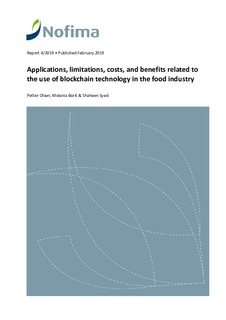| dc.contributor.author | Olsen, Petter | |
| dc.contributor.author | Borit, Melania | |
| dc.contributor.author | Syed, Shaheen | |
| dc.date.accessioned | 2019-02-19T09:01:21Z | |
| dc.date.available | 2019-02-19T09:01:21Z | |
| dc.date.created | 2019-02-05T11:40:09Z | |
| dc.date.issued | 2019 | |
| dc.identifier.isbn | 978-82-8296-581-1 | |
| dc.identifier.uri | http://hdl.handle.net/11250/2586121 | |
| dc.description.abstract | This report was commissioned to outline applications, limitations, costs, and benefits related to the use of blockchain technology in the food industry, and in particular to evaluate the pros and cons of having a blockchain-based food traceability system compared to a traditional electronic traceability system. The key concepts relating to traceability, and the components of a food traceability system are outlined in this report, as well as an indication of how traceability relates to other methodologies and approaches for ensuring food product authenticity. The core principles of blockchain technology are outlined, including different types of blockchain implementations, their characteristics, and some examples of solution providers and existing applications in the food industry. The last part of the report compares the functionality of traditional vs. blockchain-based food traceability systems, evaluates costs and benefits, and provides some practical advice on implementation issues, exemplified in the red meat supply chain and the herbs and spices supply chain. The overall conclusion is that unless speed of operation or confidentiality are considered to be the most important characteristics of the traceability system, a blockchain-based implementation may be very suitable. The main benefit related to a blockchain-based food traceability system is that, at least for now, the blockchain-based systems are more homogenous than traditional electronic traceability systems, so interoperability between different blockchain-based systems is likely to be easier to implement than interoperability between different traditional electronic traceability systems. Lack of interoperability is one of —, or probably the biggest current obstacle preventing system-wide, farm-to-fork food product traceability, so this advantage associated with blockchain-based implementations is significant. | |
| dc.description.abstract | Applications, limitations, costs, and benefits related to the use of blockchain technology in the food industry | |
| dc.description.abstract | Anvendelse, begrensninger, kostnader, og nytteverdi relatert til bruk av blockchainteknologi i næringsmiddelindustrien | |
| dc.language.iso | eng | |
| dc.publisher | Nofima AS | |
| dc.relation.ispartof | Nofima rapportserie | |
| dc.relation.ispartofseries | Nofima rapportserie | |
| dc.relation.uri | https://nofimaas.sharepoint.com/:b:/s/public/EYKcUY4fS3NFk7s6T7XDI3gBd-MY6oYxD2qXpBdxocIYZw | |
| dc.title | Applications, limitations, costs, and benefits related to the use of blockchain technology in the food industry | |
| dc.title.alternative | Anvendelse, begrensninger, kostnader, og nytteverdi relatert til bruk av blockchainteknologi i næringsmiddelindustrien | |
| dc.type | Research report | |
| dc.description.version | publishedVersion | |
| dc.source.pagenumber | 35 | |
| dc.source.issue | 4/2019 | |
| dc.identifier.cristin | 1673512 | |
| dc.relation.project | Nofima AS: 12503 | |
| cristin.unitcode | 7543,2,3,0 | |
| cristin.unitname | Næringsøkonomi | |
| cristin.ispublished | true | |
| cristin.fulltext | original | |
